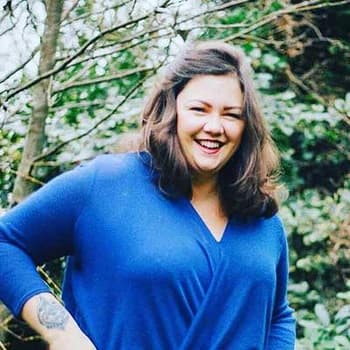Be it an eating disorder, co-dependency issue, alcohol use or substance use disorder, I call it addiction — the substance doesn’t make a difference.
When I decided to get help for myalcohol use disorder, I didn’t expect to discover a history ofeating disordersthat spanned the majority of my life. Recovery revealed a whole host of other issues I harbored, ranging from co-dependency to my desperately low self-esteem. But what preceded these problems, and led to my use of dangerous substances for 24 years, were my eating disorders.
Getting Sober
I hit rock bottom in March of 2012. Faced with the consequences of my latest binge — severe bloating and bruising, scarring on my liver and alcohol poisoning — I finally reached a place of surrender. I couldn’t go on drinking and drugging myself into an early grave.
Two days later, after dragging myself off the bathroom floor, I walked into my first Alcoholics Anonymous (AA) meeting. I figured I only needed help to stop drinking. I never expected to find out that alcohol wasn’t the problem, it was my brain.
Over the next year or so I stayed sober and studied the roots of my alcohol use disorder. What I realized in this time was that I suffered from addiction or substance use disorder. And it first started with food.
Discovering My Eating Disorders
Through working on myself with step work and therapy, I began to understand my long-standing, disordered relationship with food. Around six years old, I discovered that food could help me escape. It changed the way I felt. I remember feeling so depressed, isolated, and alone as a child like I didn’t belong. I struggled to fit in at school. I was awkward. I wasn’t easy to deal with, and I desperately wanted to escape myself. It was in food that I found relief.
Over the years, my troubled relationship with food grew more complex. It started with binging, then binging and purging, and eventually grew into starvation.
Because of my low self-esteem and lack of self-confidence, I constantly compared myself to others. As a teenager, I was taller and had a larger frame than my peers, but that only added to my feelings of exclusion. I so desperately wanted connection, and I thought I’d get that with others’ acceptance of me, that I attempted to change my looks to resemble my peers. Of course, that was futile. Trying to achieve a weight or appearance that didn’t fit my body frame only perpetuated the cycle of eating disorders.
When I discovered drugs, I thought I had found the perfect remedy. I was able to restrict food and not feel hungry. “This is the answer,” I told myself. I became awfully slim and suddenly more comfortable, having a (false) sense of control. Drugs also gave me the ability to escape my problems without putting on weight.
Takingspeed for two years resulted in a rough coming down process. Suffering fromdepression, and finding an alternative fix with relationships, only resulted in the same problem recurring: My appetite reappeared. This destructive pattern of behavior continued until I got sober. The only aspects that changed were the drugs, which were interchangeable:alcohol,cocaine, food,codeineand anything that affected how I felt and altered my reality.
Getting Sober Didn’t Solve My Eating Disorders
There is a common saying in recovery groups: More will be revealed. I’ve found that to be increasingly true. When I got sober, I stopped purging but continued to binge. I felt I couldn’t stop myself; I felt utterly out of control around food.
What became more clear to me in recovery is that I used any substance to avoid my reality and escape. Be it an eating disorder, co-dependency issue, alcohol use or substance use disorder, I call it addiction — the substance doesn’t make a difference.
Faced with 150 pounds of excess weight and an unrelenting compulsion to overeat, I needed help. Getting sober wasn’t enough. With the help of a health coach, educating myself on how addiction affects the brain, and working on my relationship with food, I was able to stop disordered eating and begin to transform my life.
The trouble with food is that, unlike drugs, you can’t abstain from it. So my strategy has been focused around learning how to nourish myself in new, non-food related ways. I search my body for what it truly needs, seek stress-relieving activities and find real connections — all of which I once sought in the wrong places. Today, and in each new day in recovery, I know a new truth: We can each recover in all areas of our lives.
Whether you’re struggling with an eating, alcohol or substance use disorder, The Recovery Village can connect you to the right kind of care. Call855.972.0310today to learn about different treatment options and facilities near you. It’s free, confidential and there is always someone available to take your call.















